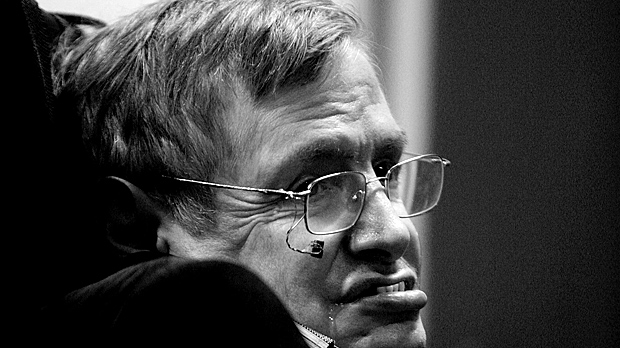Stephen Hawking celebrates his 70th birthday
Channel 4 News speaks to Professor Stephen Hawking’s biographer, celebrating the achievements of a man who was told he wouldn’t live much beyond 22 – as he becomes a septuagenarian.
One of the greatest scientific figures of our time, Professor Stephen Hawking has broken new frontiers with his research into the theory of time, space, relativity and black holes.
Hawking has been hailed as a latter-day Albert Einstein and has shed light on the origin of the cosmos, the nature of time, and the ultimate fate of the universe.
He likes to come up with really dramatic, exciting proposals. Not always something he can back up with unassailable mathematics, but something that gets everybody working, gets everybody active. Kitty Ferguson, Hawking’s biographer
All this while battling a disease which left him paralysed, and which doctors told him meant he wouldn’t live much beyond 22. On 8 January Professor Stephen Hawking celebrates his 70th birthday.
In typical style he is planning to spend it with luminaries from the world of science, at a special conference Cambridge University is hosting in his honour.
Thoughts on the thinker
Stephen Hawking has confounded the medical profession for almost 50 years. Arguably, he possesses the greatest mind since Albert Einstein, but what would he like people to think about him?
His biographer Kitty Ferguson told Channel 4 News that his scientific colleagues would consider Hawking Radiation, which he discovered in the 1970s, his most significant achievement.
“The discovery that radiation can come out of black holes, everybody thought it couldn’t – everybody thought a black hole couldn’t get smaller. But yes, radiation can come out; it’s called Hawking Radiation,” she said.
Since then, Ms Ferguson said his work has been more speculative. “He likes to come up with really dramatic, exciting proposals. Not always something he can back up with unassailable mathematics, but something that gets everybody working, gets everybody active.
The area that he’s in is very gripping because he…insists on taking non-scientists with him too – on these journeys to the very edge of human knowledge: the origin of the universe. Kitty Ferguson, Hawking’s biographer
“His ‘no boundary’ proposal – with Jim Hartle and Thomas Hertog – for the origin of the universe; you hear people talk about that. It’s a beautiful theory…But is it right? Nobody’s sure yet.”
Ms Ferguson said Hawking doesn’t mind admitting when he’s wrong however, adding: “He’s very quick to admit when he’s wrong”.
“And he says he likes to do this particularly because it lets people know that science is not this unassailable monolith of truth – it’s an ongoing, self-correcting process. It’s very important to him.”
His fame is due to both his work and his inspiring dismissal of his disability, she told Channel 4 News.
“The area that he’s in is very gripping because he…insists on taking non-scientists with him too – on these journeys to the very edge of human knowledge: the origin of the universe.”
“He’s trying to make them accessible to people like us (the theories). He doesn’t always succeed in that … but the important thing is that he’s made an adventure of it.”
A brief history of Hawking
Hawking was 22 when he was diagnosed with motor neurone disease. Doctors said he’d probably die within a few years. So he resolved to pack in as much as possible.
He married a fellow university student, Jane Wilde, and went on to have three children. When asked how, he explained: “The disease only affects Voluntary muscle.”
At the age of 42 Professor Hawking contracted pneumonia. A tracheotomy which saved his life took away his speech, and his talking computer became his lifeline.
In 1988 his ground-breaking book A Brief History of Time became a worldwide best seller, even if few of his readers really understood it. Global fame led to cameo parts in cult television shows, such as Star Trek and The Simpsons.
He did The Simpsons because he wanted to steal Homer Simpson’s idea of a doughnut-shaped universe
He did it, he said, because it would be fun – and because he wanted to steal Homer Simpson’s idea of a doughnut-shaped universe.
In 1990 he left his wife of 25 years, and a few years later married one of his nurses, Elaine Mason. The marriage ended in divorced in 2006.
Hawking believes the human race is destined to go into space. Five years ago he got as close to it as he could – in a special NASA plane that gave him a brief taste of weightlessness.
His mind probed the very nature of the universe: he predicted that black holes should emit a form of radiation, now known as Hawking radiation.
He has been showered with scientific honours, medals and prizes – though the greatest, the Nobel Prize, has as yet eluded him – possibly because he has ruffled feathers with unorthodox statements about the existence of extraterrestrials, the creation of humans through genetic engineering, and the existence of God.
